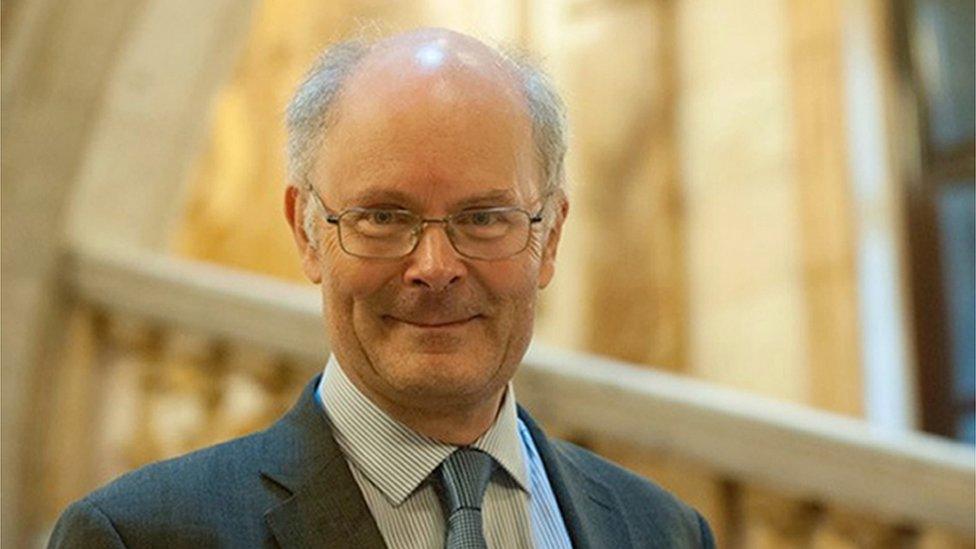Study suggests Brexit pessimism increasing
- Published

Sir John, who was knighted in the New Year Honours, is regarded as the UK's top pollster
Criticism of the UK government's handling of Brexit has increased in Scotland and across Britain as a whole, according to a study.
The research led by Prof Sir John Curtice suggested that levels of pessimism over Brexit were now "remarkably similar" across the UK.
It found that 69% of Scots think the UK government is handling things badly, up from 57% a year ago.
Across the UK, 61% of those questioned thought Brexit had been badly handled.
This was a big increase from the 41% recorded in February of last year - with Sir John saying that Leave voters are now particularly critical of how things are going.
But he stressed that this should not be taken as a sign that Leave voters had changed their minds on the merits of Brexit.
Prime Minister Theresa May is trying to negotiate a new trading relationship with the EU - but her authority is generally seen to have been diminished by Conservative party in-fighting, the resignation of key allies and a worse than expected result in June's general election.
NatCen, external, where Sir John is senior research fellow, and its Scottish arm ScotCen, external carried out face-face-interviews with 859 people in Scotland and a further 2,200 across the rest of the UK.
Sir John told the BBC's Good Morning Scotland programme that the results suggested people were "none too impressed" with the UK government's approach to the Brexit process.
'Got worse'
He said: "It won't surprise you to hear that people in Scotland have never been that impressed, but those numbers have got worse.
"However, what is interesting is that Scotland is not unique in this respect, because actually this trend towards greater pessimism about what is going to emerge out of Brexit and how well the UK government is handling things is also very apparent south of the border."
Among the other results from the surveys were:
58% of people in Scotland thought the economy would be worse off after Brexit - unchanged from a similar study last February
52% of people across the rest of the UK thought leaving the EU would be bad for the economy, a rise from 46%
52% of people elsewhere in the UK, and 55% in Scotland, now expect a "bad deal"
That compares with 37% of people across the UK last February
Support for Scottish independence was at 44% - broadly similar to the 45% recorded in the last survey
The research suggested 59% of voters in Scotland back an end to freedom of movement with the EU, slightly lower than the 64% of voters across Britain as a whole.
Sir John said that this implied that Scots would prefer to see an end to freedom of movement, but that it was less of a priority than for people south of the border.
He added: "With that exception, attitudes in Scotland towards the Brexit process are remarkably similar to those across the rest of the UK. Yes, Scotland is critical - but so is Britain as a whole."

The future of Scotland's fishing industry after Brexit has been at the centre of a row between the UK and Scottish governments
The study also examined people's thoughts on what the UK should look like after Brexit - with mixed messages for both the Scottish and UK governments.
Sir John said that the results suggested a clear majority - around two fifths - of people in Scotland want the rules on trade and on immigration to be the same in Scotland as they are in the rest of the UK after Brexit.
He said this suggested that the UK government's stance that there should be no "special deals" for Scotland was closer to the view of the Scottish public.
But he said it was the Scottish government that appeared to be on the side of public opinion when it came to the question of what should happen to powers over areas such as fishing and farming when they return to the UK from Brussels.
Sir John said: "Around three fifths of people said that all of these decisions are decisions that should be made by the Scottish government.
"And only between a quarter and a third of people think there should be some sharing of these decisions, which is in a sense what is perhaps implied by the UK government, whose stance is that we need to create a common framework before any of these powers are devolved to the devolved administrations."
What has the reaction been?
A spokesman for the UK government said: "This research shows the majority of people in Scotland support UK-wide arrangements on trade and immigration.
"We know that Scotland's exports to the rest of the UK are worth four times more than that with the EU.
"We will continue to work with the Scottish government as we put in place the necessary arrangements for Brexit, including ensuring we return powers from Brussels in a way that respects the devolution settlement."
But Scotland's Brexit Minister, Michael Russell, said the survey "shows the extent to which people are concerned about the direction of negotiations and the likely outcome".
He added: "However, I am pleased to see this research shows people in Scotland believe decisions on all devolved issues should continue to be made here in Scotland.
"The EU Withdrawal Bill must now be amended to ensure powers on issues such as fishing and farming come straight to Holyrood."